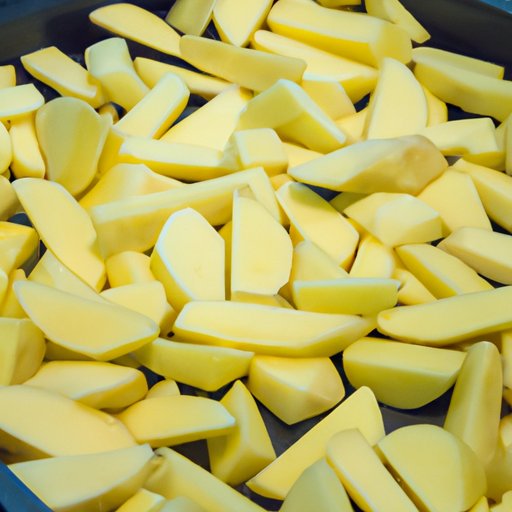
I. Introduction
Potatoes are one of the most versatile and beloved foods out there, but there’s nothing quite like a perfectly baked potato. However, many people struggle with getting that perfectly fluffy interior and crispy skin just right. Fortunately,, baking a potato is an easy skill to master with the right techniques and knowledge. In this article, we’ll take you through everything you need to know to bake the perfect potato every time.
II. Step-by-Step Guide to Baking a Perfect Potato
Choosing the Right Potatoes
The best kind of potato for baking is the russet potato. Russets have a high starch content which creates a light and fluffy interior, and their thick skin will ensure a crispy exterior.
Preparing the Potatoes
Start by washing the potatoes thoroughly under running water and scrubbing off any dirt or debris. To add flavor and texture, poke a few holes on the surface of the potato with a fork, and then rub the surface with olive oil or butter.
Loading the Potatoes in the Oven
Preheat the oven to 400°F (200°C). Line a baking sheet with foil to catch any drips and place the potatoes on it, leaving enough space in between each one. Bake them for 60 to 75 minutes, or until they are cooked through.
Checking for Doneness
To check if the potatoes are done, insert a fork or skewer into the thickest part of the potato. The potato should be tender all the way through and the fork should slide through easily. If there’s resistance, bake for a few more minutes and check again.
Resting and Carving the Potatoes
Remove the potatoes from the oven and allow them to cool for about 5 minutes before cutting them open. Slice through the center of the potato with a sharp knife and fluff up the soft flesh with a fork.
Serving the Perfect Baked Potato
Season the potato with salt and pepper, and top with a dollop of butter or sour cream, or any other toppings of your choice.
III. Different Methods for Baking Potatoes
Baking Potatoes in the Oven
Baking a potato in the oven is the most popular method. It requires more time compared to other methods, but it ensures the perfect baking results.
Using a Microwave to Bake Potatoes
The microwave method is a quicker alternative to traditional baking, but it can result in a less crispy exterior compared to the oven method. Pierce the potatoes with a fork, and then cook them for about 5 to 10 minutes on high power, or until they are cooked through.
Grilling Potatoes
Grilling potatoes gives them a smoky flavor and a crispy exterior, while retaining the soft interior. Thread the prepared potatoes onto skewers and grill for 25 to 30 minutes over medium heat, flipping them occasionally.
IV. Seasoning and Toppings for Baked Potatoes
Basic Seasoning Methods
Before baking, season the potatoes with salt and pepper, and coat them with olive oil or butter for added flavor and texture.
Popular Spices and Herbs for Potatoes
Potatoes work well with a variety of herbs and spices including garlic, rosemary, thyme and paprika.
Toppings Like Cheese, Bacon, Sour Cream, Etc.
Other popular toppings include shredded cheese, crispy bacon bits, chili, sour cream, chives, green onions, and salsa.
Creative Ways of Topping the Potatoes
For an extra special twist, try topping your baked potatoes with a variety of unique flavors such as tangy BBQ sauce, spicy jalapeños, or creamy avocado.
V. Health Benefits of Eating Baked Potatoes
Potatoes are an excellent source of complex carbohydrates, vitamins C and B6, potassium, and fiber. They also contain several antioxidants and are low in calories and fat. Compared to other starchy carbohydrates, potatoes have a lower glycemic index, which means they have less impact on blood sugar levels.
VI. Serving Suggestions
Baked potatoes work well as a side dish to complement any meal. They pair especially well with grilled steak, chicken or fish. Try adding a side salad or roasted vegetables for a well-rounded meal.
VII. Popular Varieties of Potatoes
Russet, Red, and Sweet Potatoes
Russet potatoes are the best choice for baking, while red potatoes and sweet potatoes are better for mashing or roasting. Each variety has a unique taste, nutritional value, and texture.
VIII. Troubleshooting Baked Potatoes
Common Issues While Baking Potatoes
Some common problems while baking potatoes include uneven cooking, potatoes that are too dry, and potatoes that are too soggy.
Tips for Avoiding Common Mistakes
To prevent uneven cooking, make sure the potatoes are all about the same size and thickness. To prevent dry potatoes, test for doneness as soon as they are ready. To avoid soggy potatoes, make sure to bake them in a dry oven.
How to Rescue Overbaked or Undercooked Potatoes
If the potatoes are overcooked, try adding butter or gravy to add extra moisture and flavor. If the potatoes are undercooked, return them to the oven for a few more minutes until they are tender.
IX. Conclusion
Baking the perfect potato is easy with the right techniques, knowledge and experimentation. Remember to choose the right potatoes and season them well. They can be served with a variety of toppings or as a side dish to your favorite meals.




